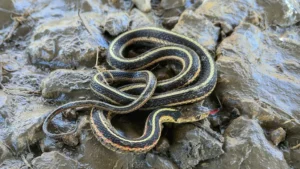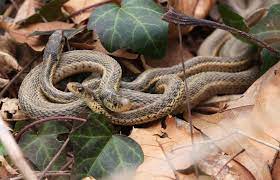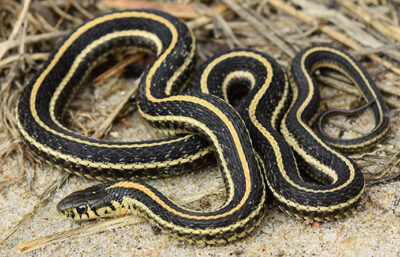Garter snakes, with their slender bodies and vibrant patterns, captivate the curiosity of nature enthusiasts and reptile lovers alike. As one delves into the world of these fascinating creatures, a common query arises: do garter snakes bite?
Yes, garter snakes are capable of biting, but they rarely pose a threat to humans. When they feel threatened or cornered, their instinct might be to bite as a defense mechanism. However, their bites are typically harmless to humans due to their small size and mild venom (if present).
Also, garter snakes are generally docile and prefer to flee rather than confront humans. If handled gently and respectfully, the likelihood of being bitten by a garter snake is minimal.
Do garter snakes bite?

Yes, garter snakes can bite, but they are generally not aggressive towards humans. If they feel threatened or are handled roughly, they may bite as a defensive reaction. However, their bites are usually harmless to humans as they are non-venomous and have small teeth.
Garter snakes do have the capability to bite, but it’s essential to understand why they might resort to this behavior. Here’s a breakdown:
- Defense Mechanism: Like many animals, garter snakes bite primarily as a defense mechanism. When they feel threatened or cornered, their instinct might be to strike out in defense. This is a natural reaction to perceived danger, and it’s a way for them to protect themselves.
- Handling: If you attempt to handle a garter snake, especially if done improperly or too forcefully, it may interpret this as a threat and bite in self-defense. Remember, snakes generally don’t want to bite humans; it’s typically a last resort when they feel they have no other option.
- Non-Venomous: Garter snakes are non-venomous, meaning their bite is generally harmless to humans. While a bite might be startling or uncomfortable due to their small teeth, it’s unlikely to cause any significant harm. However, as with any wound, it’s essential to clean it properly to prevent infection.
- Avoidance is Key: The best way to prevent a garter snake from biting is to avoid situations where it might feel threatened. If you encounter one in the wild, give it space and allow it to move away on its own. If you need to handle one for any reason, do so gently and calmly to minimize stress.
In summary, while garter snakes can bite, it’s usually a defensive reaction rather than an aggressive one. Understanding their behavior and giving them space is key to avoiding any potential bites.
How Garter Snake behavior influences biting tendencies
Garter snake behavior greatly influences their biting tendencies. Here’s how:
- Temperament: Garter snakes are generally docile and non-aggressive towards humans. Their natural instinct is to flee when encountering potential threats rather than confront them. However, if they feel trapped or threatened, they may resort to defensive behaviors such as biting.
- Communication: Garter snakes use various forms of communication to signal their intentions. They may emit musk or feces as a defensive tactic, and they may also engage in bluffing behaviors like hissing or vibrating their tails to warn potential predators or threats.
- Habitat and Environment: Garter snakes are commonly found in a variety of habitats, including grasslands, forests, and wetlands. They prefer areas with ample cover and access to water. Understanding their habitat preferences can help humans avoid encounters that may trigger defensive responses.
- Feeding Behavior: Garter snakes primarily feed on small prey such as insects, worms, amphibians, and small mammals. They use their keen sense of smell and heat-sensing pits to locate prey. While they may strike at their prey to subdue it, they rarely bite humans unless provoked.
- Handling and Interaction: If garter snakes are handled gently and respectfully, they are less likely to bite. Rough handling or attempts to capture them forcefully can trigger defensive behaviors. It’s essential to approach them calmly and avoid sudden movements to minimize stress.
Overall, garter snake behavior is influenced by their natural instincts, habitat, and interactions with humans. By understanding and respecting their behavior, humans can minimize the likelihood of triggering defensive responses such as biting.
Instances when Garter Snakes may bite

Garter snakes, though generally non-aggressive, may bite in certain situations:
- Feeling Threatened: If a garter snake feels threatened or cornered, it may resort to biting as a defensive mechanism. This can happen if someone attempts to handle the snake roughly or if it perceives other animals or humans as potential predators.
- Surprise Encounters: If a person unintentionally surprises or startles a garter snake, it may react defensively by biting. This can occur if someone accidentally steps on or grabs a snake without realizing it’s there.
- Protecting Their Territory: Garter snakes may bite if they feel their territory is being invaded, especially during mating season when males may become more territorial. Encounters near their breeding grounds or resting areas might provoke defensive behavior.
- Handling Errors: Mishandling a garter snake, such as grabbing it too firmly or restraining it in a way that causes discomfort, may lead to defensive biting. Snakes have delicate bodies, and improper handling can stress them, prompting defensive responses.
- Injured or Sick: In rare cases, injured or sick garter snakes may exhibit defensive behavior, including biting, as a response to feeling vulnerable or in pain. It’s essential to exercise caution and avoid handling snakes that appear injured or unwell.
- Protecting Their Offspring: Female garter snakes may become defensive if they perceive a threat to their offspring. Disturbing a nest or handling baby snakes may prompt defensive behaviors from the mother.
- Mistaken Identity: Sometimes, a garter snake may mistake a human hand or foot for prey, particularly if there are strong scents of food present. In such cases, a snake may bite in an attempt to capture what it perceives as food.
Overall, while garter snakes are typically harmless and prefer to avoid confrontation, there are instances where they may bite in self-defense or due to other triggers. It’s essential to treat them with respect and caution to minimize the likelihood of such encounters.
Mitigating Garter Snake Bites
To mitigate the risk of garter snake bites, you can take several precautions:
- Avoid Provoking Them: The best way to prevent snake bites is to avoid provoking or startling garter snakes. Give them space and allow them to move away if you encounter them in the wild.
- Wear Protective Clothing: If you’re working in areas where garter snakes are present, consider wearing long pants, boots, and gloves to minimize the risk of being bitten if you accidentally come into contact with one.
- Learn to Identify Them: Knowing how to identify garter snakes and other harmless snake species can help you distinguish them from venomous snakes. This knowledge can ease anxiety and help you react appropriately if you encounter one.
- Use Caution When Handling: If you need to handle a garter snake for any reason, do so gently and carefully. Avoid sudden movements that could startle or stress the snake, as this may increase the likelihood of it biting in self-defense.
- Keep Pets Away: If you have pets, supervise them when they’re outdoors, especially in areas where garter snakes are known to inhabit. Pets may inadvertently provoke snakes, leading to defensive bites.
- Educate Others: Teach children and others who may encounter garter snakes about the importance of respecting wildlife and how to safely interact with them to minimize the risk of bites.
- Seek Medical Attention if Bitten: If you are bitten by a garter snake, even though their bites are generally harmless, it’s still essential to clean the wound thoroughly and monitor it for signs of infection. If you experience any unusual symptoms, seek medical attention promptly.
By taking these precautions and respecting garter snakes and their habitats, you can greatly reduce the likelihood of encountering bites and promote harmonious coexistence with these fascinating creatures.


